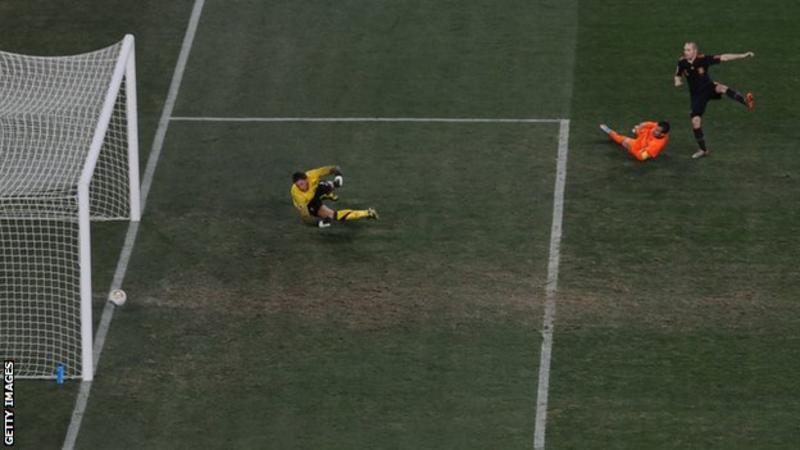The story of Spain’s ‘terrifying confidence’ – and how it conquered the world

On 6 September 2006, in front of 14,500 fans at Windsor Park, Spain's serial underachievers once again came up short, losing 3-2 to Northern Ireland in a Euro 2008 qualifier.
No-one back home was particularly surprised. This was a side who had flattered to deceive for years. Since winning their only title - the 1964 European Championship - they had just once progressed beyond the quarter-finals of a major tournament.
Luis Aragones, the La Liga veteran appointed national team manager in 2004, had begun his reign with a promising 25-game unbeaten run. But once again the optimism disappeared, this time following a last-16 defeat at the 2006 World Cup by an ageing France side many felt were entirely beatable.
Three months on, Aragones knew something had to be done. That night in Northern Ireland convinced him things had to change.
It was the start of something remarkable. Within six years, Spain would be heralded as the most successful international team of all time. This is how it happened.
Short presentational grey line
Short presentational grey line
There had always been rumours about friction and conflict between players from different clubs and regions in Spain. When they lost the European Championship final to France in 1984 following a terrible goalkeeping mistake from the normally reliable Luis Arconada, some even made the absurd suggestion that he had made the error on purpose because he was Basque and did not want Spain to win.
"There were a lot of players from Real Madrid and others from Barcelona - and when we got together, you noted a certain distance from players of different teams," says former Spain striker Fernando Morientes of the side he played in during the early Aragones era. "There wasn't the same togetherness in the day-to-day living that we see now."
Politics wasn't the main barrier to success this time, though. First of all, it was the tactics.
Against Northern Ireland in Spain's second competitive
match after the 2006 World Cup, Aragones realised that
the style favoured by his predecessors - a direct,
or even long-ball approach - was not working.
But in order to achieve the change he wanted,
harsh choices had to be made. Choices that brought Aragones perilously close to losing his job.
Real Madrid superstar Raul was much more than just another player. He was an icon. To many Spaniards, he was the essence of what they thought their country's football should be.
After the defeat in Belfast, Aragones saw that Raul no longer fitted into Spain's overall plan. He dropped the striker. Madrid's media went into meltdown. Axing a legend was bad enough, but this was compounded - in their opinion - by the disrespect of not having contacted the player personally to inform him.
Raul was 29. The Northern Ireland game was his 102nd for Spain. It would be his last. Aragones was unapologetic.
"I didn't call Raul to let him know he wasn't selected," he said. "He is not an exceptional case. The simple fact is that the players I've called up are most suited to our needs."
While the manager set about trying to reinvent Spain's style of play, Madrid's media sharpened their knives.
Defeat by Sweden and a draw in Iceland meant the team were in danger of missing out on Euro 2008 altogether when they travelled to Denmark on 13 October 2007. A loss in Aarhus would almost certainly have sealed Aragones' fate.
Instead, it went down as the night Spanish football was reborn.
Former Barcelona striker David Villa, remembering the game, says: "We had everything to play for. If we'd lost, we would have been looking for a place in the play-offs at best. Maybe we wouldn't even have managed that."
Aragones' Eureka moment came in the 39th minute, when a 30-pass move culminated in then full-back Sergio Ramos chipping the ball over the Denmark goalkeeper for Spain's second goal. They went on to win 3-1 and qualified for the Euros as group winners.
More importantly it signalled the arrival of the new Spain, defined by passes and collective work.
Fernando Hierro, who was Spain's sporting director at the time, recalls: "There was a lot of tension before the game because of the importance of that fixture.
"Denmark were very strong, but we were calm and Luis was responsible for relaying that calm to everyone, saying: 'Don't worry, relax, tomorrow we'll win 3-1.'
"Incredibly, he even got the scoreline right."
Midfielder Marcos Senna sums up the change in style succinctly: "For the first time Aragones opted to go for the small ball players in the middle."
The manager had examined the gifts he had at his disposal. Plenty of very good midfielders. Passers of the ball. He decided to use them - but he added a bit of spice as well. On numerous occasions, he would say to Xavi, Andres Iniesta and Santi Cazorla: "How do you win games? Scoring, no? Why the hell don't you score more?"
The seed was planted for a style that was beautiful to watch, but also efficient.

iSQI CTFL-PT Practice Test Study Tips And Information
- Passing the ISTQB Certified Tester Foundation Level - Performance Testing CTFL-PT certification

Online Casino Cheats In Malaysia
- Gambling has always been a part of human history, no matter where we are in the evolutionary process

Cola Caper: Spin To Win At Lucky Cola Casino
- Lucky cola is one of the most recognized soft drink brands in the world. It has gained popularity

Direct Access: The Ultimate Blast Game Site With Direct Port
- Get the ultimate recruiting advantage with Blast. Its the only technology that lets serious players unlock their potential